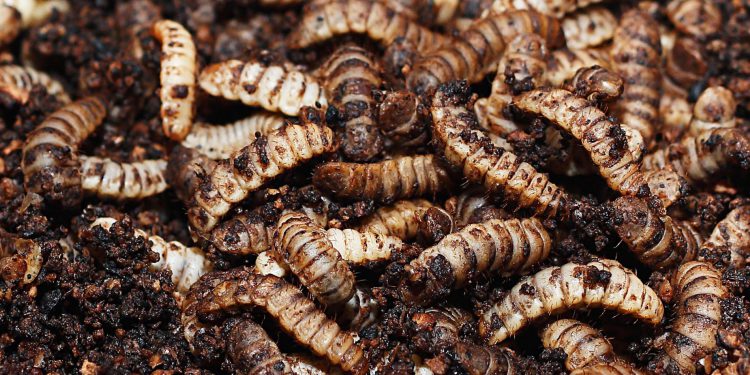Research from the universities of Stellenbosch and Queensland says there is incomplete food safety information on black soldier fly larvae.
To inform regulation, the researchers call for more work on microbial risks, allergenicity and risks from bioaccumulation of heavy metals.
Despite its nutritional and sustainability benefits, the focus has remained on the larvae’s potential in animal feed. As a result, research on their food safety is lacking and the larvae has yet to be specifically regulated in any country.
The larvae have a nutritional profile ideally suited to humans, rich in micronutrients such as zinc, iron and calcium. They have a high protein content and good amino acid profile. They also hold sustainability advantages. They could replace protein sources such as beef or soya which are less land and water efficient, and which drive deforestation.
The larvae have an ability to breakdown and survive in highly pathogenic environments. Their unrestricted diet is ideal for circular food production by enabling them to be reared on diverse waste streams. However, it is exactly this potential for waste up-cycling that the researchers consider to be of greatest food safety concern.
“There is one major hurdle that is very difficult to overcome and that is mad cow disease”
“The big issue with the circular economy thing is that you’re feeding these insects waste,” said Professor Matan Shelomi, a researcher on edible insects at the University of Taiwan.
“You’re giving them something that you yourself would not eat… There is the risk that all the contaminants that were in the waste that make it unsafe for humans would either make it unsafe for the insect or make the insects unsafe for us.”
The study says research first needs to prove that waste reared larvae are in fact safe to eat, or identify the waste streams that would be safe, as well as any post-harvest processes that could be used to ensure food safety. The paper also says bioaccumulation of heavy metals, micro-plastics or pharmaceuticals present in the feed needs to be addressed.
“Regardless of the production process, all the novel foods are assessed in a specific way,” said Ermolaos Ververis, a scientific officer at the European Food Safety Authority (EFSA), the organisation responsible for providing the European Commission independent advice on risks in the food supply chain.
“There will not be any, let’s say, special treatment.”
An EFSA spokesperson adds, “As per the safety assessment of all novel foods in the EU, the safety of [the larvae] will be evaluated based on data that will have to follow the guidance provided by EFSA.”
“There is one major, major hurdle that is going to be very difficult to overcome and that is mad cow disease,” said Professor Shelomi.
Prions are expensive to work with and require a biosecurity clearance only available to a small number of labs
Feeding waste of animal origin to livestock is banned in the EU due to the risk of prion diseases such as bovine spongiform encephalopathy, or mad cow disease. Flesh, manure and post-consumer waste are banned, therefore using larvae in converting waste to food remains greatly limited.
“It’s fatal. They’re taking a zero tolerance stance on this, and understandably so,” said Professor Shelomi. “You could probably give [black soldier fly] prion contaminated feed and they might even decontaminate it. They might destroy the prion and make everything better. But that’s still speculation. That has to be proven.”
Prions, are however expensive to work with and require a biosecurity clearance only available to a small number of labs.
“Essentially we need to set up a collaboration. Someone who understands black soldier fly needs to bring them to the incredibly bio-secure prion lab and test it,” said Professor Shelomi.
The publication of the research follows news from October last year of UK startup Entocycle receiving £10m in government funding to produce animal feed made from black soldier fly larvae reared on food waste.
Last week, yellow mealworms were assessed as being safe to consume under the proposed uses and use levels by EFSA. They remain the only edible insect with a completed safety assessment from the organisation. Other edible insects are under review, with a completed safety assessment of black soldier fly larvae, raised on feed, expected in the coming months.























